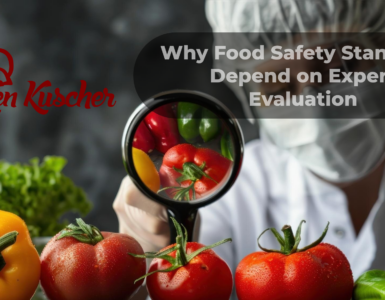The Importance of Expert Witness Reports in Legal Contexts
Food safety liability cases often hinge on technical details that require specialized knowledge. In many instances, the outcome of a lawsuit can depend on whether or not an expert can clearly explain how a specific food safety protocol was applied or neglected in a given situation. Attorneys, insurers, and regulatory agencies rely on expert witness reports to clarify whether food service operations met or violated industry standards. These reports not only summarize findings but also translate complex scientific and regulatory information into language that legal professionals and non-specialist audiences can understand.
The role of expert witness reports extends beyond a simple technical explanation. They provide a foundation for understanding how food was handled, stored, and prepared, ultimately influencing liability decisions in litigation. For example, a well-documented report may highlight whether a restaurant adhered to refrigeration guidelines, if cross-contamination prevention practices were followed, or if cooking temperatures were properly monitored. By connecting these practices to established industry standards, expert reports help build a bridge between food safety science and the legal framework governing liability.
Foodborne illness claims, contamination disputes, and restaurant negligence cases frequently involve complex evidence that can be misinterpreted without professional guidance. In cases where multiple parties are involved such as suppliers, distributors, and restaurant operators the factual matrix becomes even more complicated. Without expert interpretation, judges and juries may struggle to assess the facts or to determine the extent of each party’s responsibility.
Expert witness reports serve as critical tools, offering structured, evidence-based evaluations that align with accepted food safety regulations and industry norms. These evaluations typically include detailed analysis of documentation, inspection reports, employee training records, and compliance with codes such as those outlined by the Food and Drug Administration (FDA) or the Centers for Disease Control and Prevention (CDC). By incorporating both scientific reasoning and regulatory frameworks, expert witness reports give courts and insurers the clarity they need to make well-informed decisions.
Defining the Role of Expert Witness Reports
An expert witness report is a formal document prepared by a qualified professional that presents findings and opinions relevant to a legal case. These reports carry significant weight in the courtroom because they transform technical evaluations into structured, evidence-based insights that can directly impact the outcome of litigation. In food safety liability disputes, the scope of an expert witness report often covers multiple areas of operational compliance, including:
- Assessment of Food Handling Procedures: One of the most critical elements examined in expert witness reports is whether employees complied with required certifications such as florida food handler certificates. This assessment helps determine if food service workers were adequately trained to prevent cross-contamination, handle allergens properly, and maintain safe temperature controls during preparation and service. The presence or absence of valid certifications can serve as compelling evidence in establishing whether industry standards were met.
- Evaluation of Sanitation Practices: Reports often include a detailed review of sanitation protocols within kitchens, storage facilities, and service areas. This evaluation considers whether establishments adhered to federal and state hygiene requirements, including routine cleaning schedules, pest control measures, and proper waste disposal. Identifying lapses in sanitation practices can highlight systemic negligence that may have contributed to a foodborne illness outbreak or contamination event.
- Analysis of Training Records: Beyond operational practices, expert reports frequently examine documentation to confirm that staff held valid florida food handlers card. Training records provide insight into whether employees were consistently updated on evolving food safety regulations and whether management prioritized ongoing education. Missing or outdated records can suggest organizational shortcomings in maintaining compliance and protecting consumer health.
- Examination of Supply Chain Integrity: Expert witness reports also investigate whether food products were sourced, transported, and managed according to recognized safety protocols. This includes verifying supplier certifications, evaluating temperature logs during transport, and analyzing traceability documentation in the event of contamination. A breach in the supply chain can shift liability from a restaurant or retailer to upstream vendors, underscoring the importance of meticulous supply chain evaluation.
By systematically addressing these areas, expert witness reports form the backbone of courtroom testimony. They ensure that expert insights are documented in a clear, authoritative manner, providing judges and juries with the technical context needed to render fair and informed decisions. Furthermore, these reports reinforce accountability across the entire food service ecosystem, from frontline employees to corporate stakeholders, shaping both legal outcomes and future industry practices.

The Influence of Food Safety Regulations
Expert witness reports gain credibility by referencing authoritative regulatory frameworks that establish the benchmarks for safe and responsible food service operations. In litigation, the ability of an expert to tie observed practices directly to federal guidelines often determines how persuasive their testimony will be. The U.S. Food and Drug Administration (FDA), Centers for Disease Control and Prevention (CDC), and U.S. Department of Agriculture (USDA) all provide detailed guidance on safe food practices that shape the foundation of liability assessments.
FDA Food Safety Guidance
The FDA issues comprehensive food safety regulations that serve as national standards for preventing contamination across restaurants, retail establishments, and food production facilities. FDA guidance covers critical areas such as proper labeling, allergen management, safe storage conditions, and hazard analysis under the Food Safety Modernization Act (FSMA). When expert witness reports reference these standards, they help determine whether a business took proactive steps to comply or demonstrated negligence by ignoring established requirements.
CDC Foodborne Illness Prevention
The CDC plays a central role in monitoring, controlling, and reporting foodborne illness outbreaks. Through surveillance programs like FoodNet, the CDC collects national data that helps identify common pathogens, high-risk foods, and vulnerable populations. In courtroom contexts, expert witness reports may rely on CDC findings to explain how illnesses spread, whether symptoms align with a suspected pathogen, and how quickly a business responded to a potential outbreak. By grounding testimony in CDC prevention guidelines, experts strengthen the causal link between unsafe practices and consumer harm.
USDA Food Safety and Inspection Service (FSIS)
For meat, poultry, and processed foods, the USDA’s Food Safety and Inspection Service establishes rigorous inspection protocols. These include requirements for microbial testing, sanitary slaughter processes, and temperature control during storage and transport. Expert witness reports frequently draw on FSIS protocols to show whether contamination could have occurred at the production level, in distribution, or within a food service establishment. This helps clarify liability when multiple parties are involved in the supply chain.
When expert reports incorporate these standards, they carry significant weight in demonstrating whether a business operated responsibly or negligently. By linking observed evidence such as improper temperature logs, missing certifications, or sanitation failures to FDA, CDC, and USDA frameworks, experts provide courts with a clear regulatory context. This not only strengthens the credibility of their reports but also ensures that legal decisions align with nationally recognized public health priorities.
How Expert Reports Shape Liability Determinations
In food safety disputes, liability often depends on whether an establishment took reasonable and documented measures to prevent harm. Courts must determine not only what happened, but also whether the business acted in line with industry norms and regulatory expectations. Expert witness reports provide the framework for this evaluation by dissecting evidence and connecting it to established standards. Their structured analysis helps clarify three central issues in litigation:
- Causation: One of the most contested aspects of food safety cases is establishing causation. Did improper handling directly cause the alleged illness or injury? Expert witness reports examine medical records, outbreak timelines, laboratory test results, and food preparation logs to determine whether a clear link exists between the consumer’s illness and the food in question. This step is crucial because without a scientifically sound explanation of causation, liability claims may lack credibility in court.
- Standard of Care: In addition to proving causation, courts must evaluate whether the business maintained the same level of responsibility as comparable establishments. Expert reports assess whether food service operations demonstrated reasonable care through practices such as proper sanitation, safe storage, and adequate training. By comparing the defendant’s practices to industry-wide standards, experts can show whether the establishment fell short of what a prudent operator would have done under similar circumstances. This comparison is often decisive in determining negligence.
- Compliance: A critical factor in liability determinations is whether food safety certifications, such as food handler certificates Florida, were up to date and properly documented. Expert witness reports review employee records, training certifications, and inspection results to verify compliance. Gaps in certification or expired credentials can signal systemic management failures that directly impact liability outcomes. Conversely, strong documentation of compliance can serve as a defense, showing that the establishment took reasonable precautions.
By providing objective evaluations, expert witness reports allow legal teams to establish whether liability rests with the restaurant, supplier, or another party in the food service chain. These reports not only help courts assign responsibility but also encourage greater accountability across the industry by highlighting the importance of preventive measures and regulatory adherence. Ultimately, their influence ensures that liability is determined on the basis of evidence, fairness, and public health priorities.
Foodborne Illness Litigation and Report Analysis
Foodborne illness cases are among the most common scenarios requiring expert reports. These cases demand careful evaluation of evidence such as:
- Refrigeration logs and temperature records
- Employee hygiene practices
- Training certifications like florida food handler certificates best price
- Vendor sourcing documentation
Expert witness reports help establish whether contamination resulted from improper storage, employee negligence, or supplier misconduct. Such clarity is essential in cases involving multiple parties and insurance claims.
Restaurant Liability and Operational Disputes
A restaurant expert witness may be called upon to prepare a report that addresses issues beyond foodborne illness. While food safety is often at the forefront of liability cases, restaurants also face a wide range of operational disputes where expert insight becomes essential. These reports provide courts with impartial evaluations that extend to multiple aspects of restaurant management and compliance. Common areas of focus include:
Facility Safety Hazards
Restaurants are required to maintain safe environments for both employees and patrons. An expert may review accident reports, inspection records, and facility maintenance logs to determine whether hazards such as wet floors, poor lighting, or faulty equipment contributed to injuries. By comparing safety practices to OSHA standards and industry norms, the expert helps clarify whether reasonable precautions were taken.
Alcohol Service Compliance
Another frequent area of dispute involves alcohol service. A restaurant expert witness may examine staff training in responsible beverage service, compliance with state liquor laws, and documentation of incidents involving intoxicated patrons. These evaluations are critical in cases where establishments are accused of overserving customers or contributing to alcohol-related accidents.
Employee Supervision and Training
Labor-related disputes often hinge on whether restaurant management provided adequate supervision and training. Expert reports may assess staff scheduling practices, employee certifications, and adherence to internal policies. By doing so, they help determine if lapses in supervision directly contributed to misconduct, errors in service, or unsafe practices.
Labor and Wage Disputes
Restaurants are also vulnerable to claims involving wage violations, tip pooling, and overtime pay. In these cases, experts review payroll documentation, scheduling records, and employment policies to evaluate compliance with labor laws such as the Fair Labor Standards Act (FLSA). Their reports ensure that courts can distinguish between legitimate labor grievances and unfounded claims.
By addressing these operational areas, reports prepared by a restaurant expert witness ensure that courts have objective, detailed information on whether a restaurant’s operations adhered to accepted standards. This impartial analysis is particularly important in disputes where liability is contested by multiple parties such as landlords, management companies, and franchise owners, each of whom may attempt to shift responsibility.
The Role of Food Safety Experts in Report Preparation
Experienced professionals such as Ken Kuscher are recognized for their ability to provide comprehensive evaluations as a food service expert witness. In litigation, the credibility of a report often rests on the depth of expertise behind it, making the selection of a qualified food safety expert a decisive factor in legal outcomes. A seasoned professional brings decades of industry knowledge, regulatory familiarity, and hands-on experience, ensuring that expert witness reports are both accurate and defensible in court.
A qualified food safety expert goes far beyond simply reviewing documents. These professionals conduct a thorough examination of all relevant evidence, including employee training records, sanitation logs, inspection reports, and supply chain documentation. By doing so, they are able to identify gaps or inconsistencies that may indicate negligence, as well as highlight compliance measures that demonstrate responsible practices.
What sets food safety experts apart is their ability to contextualize findings within industry standards. Rather than presenting raw technical data, they frame their evaluations in a way that aligns with regulatory guidelines from authorities such as the FDA, CDC, and USDA. This connection between evidence and recognized food safety protocols provides courts, insurers, and attorneys with the assurance that conclusions are based on universally accepted practices.
Equally important is the expert’s skill in translating technical food safety protocols into clear, understandable language. Legal teams and jurors often lack specialized knowledge of microbiology, sanitation engineering, or hazard analysis systems such as HACCP. By simplifying these complex concepts without losing scientific accuracy, experts like Ken Kuscher make it possible for decision-makers to fully grasp the implications of the evidence presented.
For attorneys, insurers, and regulatory bodies navigating complex cases, food safety experts are invaluable allies. Their reports not only clarify liability but also provide actionable insights that can improve future compliance, reduce legal risks, and strengthen food service operations. In this way, the role of the expert extends beyond litigation, influencing industry practices and raising the bar for accountability across the food service sector.

The Structure and Presentation of Expert Reports
The effectiveness of an expert witness report often depends on its clarity, organization, and ability to communicate complex information in a format that both legal professionals and laypersons can understand. A well-prepared report not only summarizes technical findings but also demonstrates the expert’s impartiality and adherence to established standards. Strong reports typically include several essential components that build credibility and persuasiveness in the courtroom:
- Background and Credentials: The report begins by establishing the expert’s qualifications, academic background, professional certifications, and relevant industry experience. This section is critical, as it demonstrates why the expert is uniquely positioned to evaluate the case. For example, a food safety consultant with decades of experience conducting inspections and training programs offers a perspective that carries significant weight with judges and juries. Clearly outlining credentials helps preempt challenges to the expert’s authority.
- Case-Specific Analysis: After establishing credibility, the report turns to a detailed examination of the evidence specific to the case. This may include reviewing employee certifications, such as food handler training records, analyzing compliance with state and federal food safety regulations, or assessing sanitation logs and inspection reports. Case-specific analysis ensures that the findings are tailored to the facts at hand rather than relying solely on general industry knowledge.
- Findings: The findings section presents a structured summary of whether the food service operation met regulatory and industry standards. This can involve evaluating whether safe food storage conditions were maintained, whether cross-contamination controls were enforced, or whether supply chain protocols were followed. Findings are typically supported by references to authoritative frameworks such as FDA, CDC, or USDA guidelines, ensuring that the conclusions are grounded in recognized standards..
- Opinion: Finally, the report provides a neutral, evidence-based opinion that integrates the analysis and findings into a clear conclusion. The expert avoids advocacy and instead focuses on presenting a reasoned judgment based on facts and recognized practices. This objectivity is what makes expert witness reports so powerful in litigation: they provide courts with unbiased evaluations that can tip the balance in determining liability.
This systematic approach ensures that courts and legal teams can follow the reasoning behind the expert’s evaluation without confusion or ambiguity. By combining professional authority, detailed evidence review, structured findings, and a balanced conclusion, expert witness reports serve as indispensable tools in clarifying complex disputes and guiding fair outcomes.
Insurance and Risk Assessment Applications
Insurance companies often depend on expert reports to evaluate claims and assess liability in food safety disputes. Because insurers must determine whether a loss is covered under the terms of a policy, they rely heavily on independent, evidence-based evaluations. Reports that highlight lapses in certification, such as missing or expired florida food expert witness documentation, can significantly affect coverage outcomes and determine whether compensation is granted or denied.
From an insurer’s perspective, expert witness reports serve several important functions:
Claims Validation
When a business files a claim related to foodborne illness, contamination, or operational disruption, insurers must confirm the legitimacy of the claim. Expert reports provide technical clarity, verifying whether the alleged incident is consistent with known safety violations or if other factors may have caused the loss.
Risk Allocation
In disputes involving multiple partiessuch as suppliers, distributors, and restaurantsexpert analysis helps insurers assign responsibility. By examining supply chain records, training certifications, and compliance logs, expert reports can pinpoint where the failure occurred and which party should bear the financial burden.
Policy Compliance
Many insurance policies require that food establishments maintain updated training certifications, adhere to sanitation regulations, and document risk prevention protocols. When expert reports reveal deficiencies such as expired staff training or missing florida food expert witness documentation insurers may reduce coverage, increase premiums, or deny claims altogether. Conversely, strong documentation of compliance can strengthen a policyholder’s position and expedite claims resolution.
Risk Mitigation and Prevention
Beyond claims handling, insurers also use expert witness reports to identify recurring patterns of negligence or operational weaknesses. These insights allow insurers to recommend corrective measures, adjust coverage terms, or provide incentives for improved compliance. This proactive use of reports not only protects insurers from fraudulent or inflated claims but also encourages businesses to strengthen food safety practices.
By providing independent analysis, expert reports help insurers make fair and evidence-driven decisions. They ensure that liability assessments are grounded in fact, not assumption, and that policyholders are treated equitably. In this way, expert witness reports serve as a critical bridge between food safety science, legal accountability, and financial risk management.





